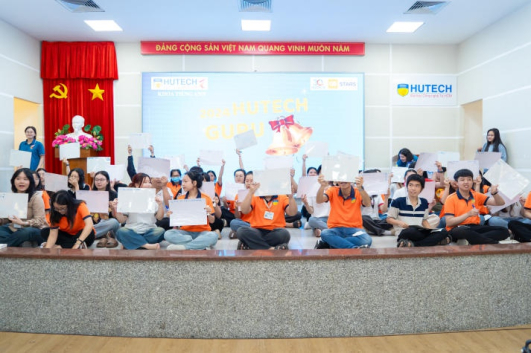Analyzing Practical Applications and Leadership Competence in Language Program Management with HUTECH Experts
- 26/05/2025
On May 11, the English Language Faculty, in collaboration with the Institute of Graduate Education at Ho Chi Minh City University of Technology (HUTECH), organized an academic seminar titled “Language Program Administration: Key Factors for Success”, attracting the participation of over 100 lecturers and graduate students.
The session was led by Dr. Nguyễn Thị Ngọc Dung, a lecturer from the English Language Faculty. She began with a thought-provoking question: “What is the difference between a teacher and a language program administrator?” This is the prompt that guided participants on a journey to reexamine their own professional roles: not merely as educators, but also as organizers, leaders, and positive influencers in academic environments.
The seminar attracted the participation of numerous lecturers and graduate students.
In the core segment of the program, participants were invited to engage in a comparative analysis of two roles: LT (Language Teacher) and LPA (Language Program Administrator). This exercise encouraged them to reflect on their existing skills and identify the competencies they would need to develop in order to transition from teaching to leadership. Key factors such as internal communication, program control, resource management responsibilities, observation and evaluation skills, and the ability to coordinate a team were thoroughly examined through group discussions and scenario-based activities.
Participants were invited to explore a comparative framework between the roles of LT (Language Teacher) and LPA (Language Program Administrator).
Moving beyond theory, the seminar presented a series of real-life examples highlighting the challenges commonly faced by LPAs, ranging from designing a new curriculum with limited funding, to assuming a coordinator role without formal training, or navigating conflicting expectations from the school’s leadership and teaching staff. These scenarios were not only illustrative but truly reflective of the realities in modern educational environments, where leaders must possess not only expertise but also adaptability in management and empathy in interpersonal relations.
Dr. Nguyễn Thị Ngọc Dung also emphasized that leading a program is not about exercising authority, but about the ability to influence, build trust, and inspire others to grow. One of the seminar’s key focuses, people management, was addressed as an art that requires a balance between rationality and emotional intelligence. Aspects such as recruitment, evaluation, professional development support, work-life balance, and respect for cultural diversity, etc. were presented as essential criteria in shaping a positive and sustainable working environment.
Dr. Ngọc Dung offered many insightful perspectives on leadership, particularly within the field of language education.
Notably, time was placed at the center of leadership thinking. Rather than becoming a “superhuman” who works non-stop, a manager must learn to use time as a strategic tool to achieve meaningful goals. The ability to prioritize, manage one’s schedule effectively, and maintain composure is essential to cultivating a strategic mindset and reducing stress while increasing productivity.
For participants who were eager to pursue entrepreneurship, the seminar also emphasized that starting an English language center requires more than just professional expertise; it demands a comprehensive understanding of program management. From financial and time management to human resources, risk control, and teaching quality assurance, all of these are crucial factors that determine the operational effectiveness and competitiveness of a language education institution in a rapidly changing market.
Leadership and strategic planning also require ongoing practice and refinement.
To conclude the seminar, the speaker delivered a profound message: an effective educational manager must not only excel in professional expertise but also think long-term like a strategic planner. Such individuals are not merely running an academic program; they are actively shaping an academic culture, inspiring both their team and learners, and thereby contributing to the overall enhancement of the educational environment’s quality.
The seminar provided a wealth of useful information for participating lecturers and graduate students.
The “Language Program Administration: Key Factors for Success” seminar was more than just an informational session; it was a true opportunity for lecturers and graduate students to reflect on their career journeys, restructure their mindset, and reidentify their roles within the broader landscape of modern educational development.
Report: Bảo Thư
Photos: Viện Đào tạo Sau Đại học
Media Center
-
“Thoát Hoan” Lê Hoàng Phúc crowned the champion of HUTECH Acting Stars 2024

-
[Video] Flame of Entrepreneurship - Paving the Path to Success with HUTECH Alumni

-
HUTECH English Majors Experience International-Standard Training Model at IELTS Mentor

-
Fostering Passion and Reaching New Heights of Global Integration through the 2025–2028 English Language Faculty’s Congress of the Associated Organ of Vietnamese Students’ Association

-
Analyzing Practical Applications and Leadership Competence in Language Program Management with HUTECH Experts

-
English Majors Confronting and Overcoming Challenges in Today’s Translation Industry





